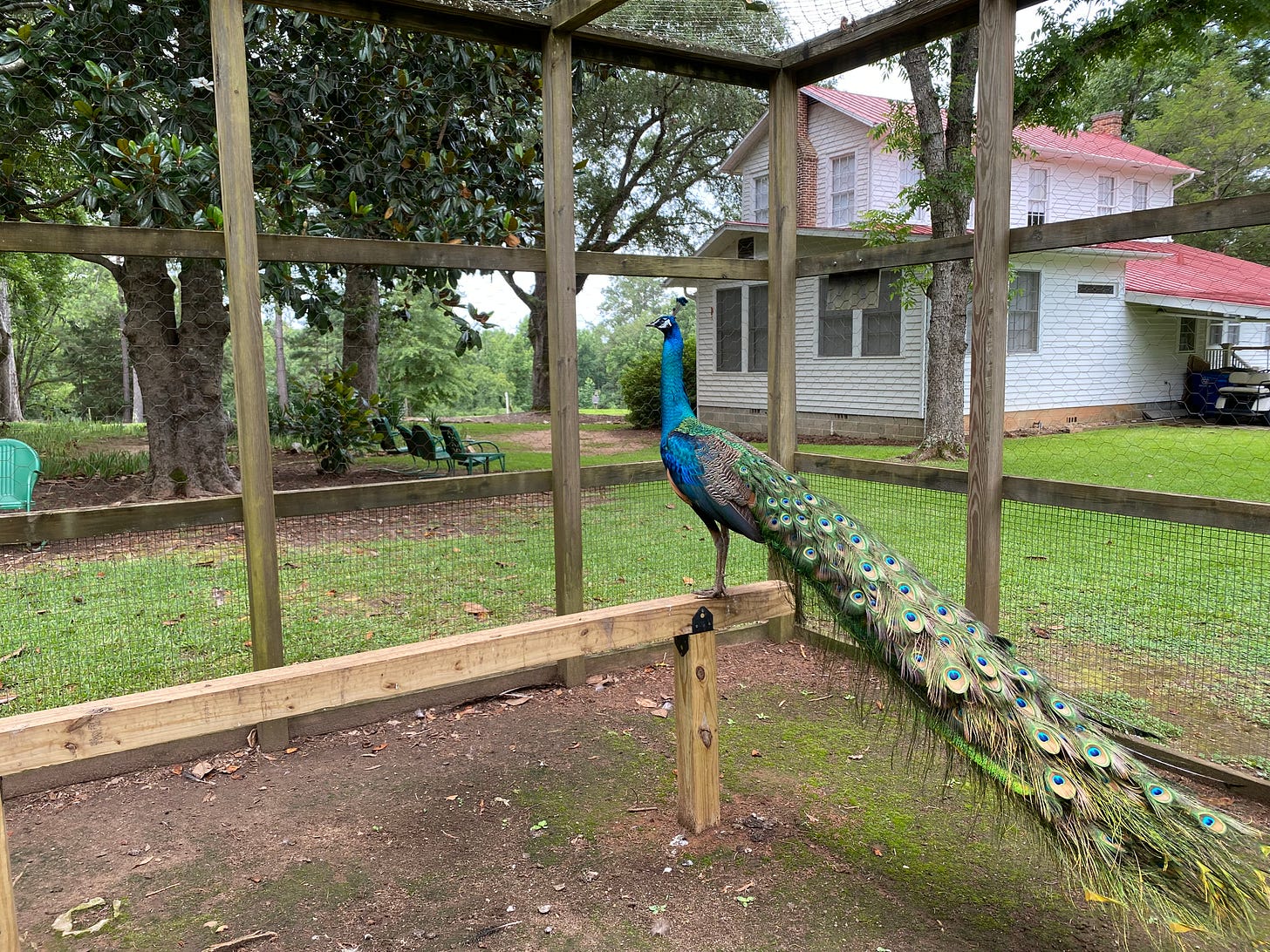Today is the 100th birthday of my favorite author, Flannery O’Connor.
If you’ve read Why I Dyed My Hair Purple and Other Unorthodox Stories or have just been around Peculiar Crossroads for a while, you know that Flannery and I have a history.
Not just because I’m a writer or that she has influenced my work more than any other author but because her novel Wise Blood played a significant role in my becoming a Christian.
(If that peaks your interest, go buy the book. It’s a juicy bit of information, and I’m not giving it away for free.)
However, the spiritual and literary connections aren’t the only bond Flannery and I share. I also relate to her life story in a million personal ways.
We both were extremely odd, quirky, only children.
We both had fathers experience serious, life-threatening illnesses in our teen years (Flannery’s father would succumb to lupus).
We were both diagnosed with autoimmune conditions in our ‘20s.
We both received our Master of Fine Arts degrees very young and sat in writing workshops that left us frustrated.
The similarities continue, but these should be enough to set us up for this month’s installment of Why I Dyed My Hair Purple: B-Sides, where we’ll be exploring a Flannery O’Connor piece that didn’t make it into the final book.
I fully admit that “Flannery and Me” went out on a tenuous limb. I think I expected one of my wonderful editors at Calla Press Publishing to tell me that it took too many liberties. Yet, I included it in the original manuscript anyway.
I’m not really sure why I did this even though I knew I would be asked to cut it. It really isn’t like me to be vulnerable and deliberately put myself in situations where I know I’ll be rejected.
Maybe I just needed to make sure my publishing team knew how much she means to me.
The essay about Flannery that ended up in the final book is a lot more anchored to my faith journey. I’m glad that it is the version people will read.
But as we celebrate the Flannery Centennial, I need to share this version too.
Here it is.
*
I
We are six years old, and our mothers have reached a mutual impasse on how to deal with us. Regina O’Connor tells Kathy Frazier that her daughter Flannery won’t play nice with the other children. When Regina invites other little girls to the house, Flannery forces them to sit down and listen to her stories instead of playing tea party with their dolls or some other nice game.
My mom chimes in that she has the same problem with me, except I wander around telling stories to myself out loud and don’t talk to the other kids. Because I already know how to read, I find the crafts and ABC lessons in kindergarten boring, and I usually end up hiding in the bathroom with books.
They chalk it up to Weird Only Child Syndrome and decide that maybe if they get the two of us together in the same room, two oddballs might equal out to something even. They deposit us both in Flannery’s room like variables in an experiment and then head downstairs for coffee and chit-chat.
Flannery and I stare at each other. She is wearing a beret. Her eyes are dark, intense, and slightly terrifying. Then, she heads for the door and motions for me to follow with an authoritative wave of her hand.
“Come on,” she says. “We’re going outside.”
“Why?” I say. I had brought my copy of The Wizard of Oz and planned to read it to her and play all the characters.
“To see my chicken. I taught it to walk backward. A newsreel man came and everything.”
She says this like it’s common knowledge, and I, of course, should be aware that the program for the day is to go and see the chicken.
“No way,” I object. “Chickens are gross. They smell.”
Her eyes widen with a fury that seems too big for a child. “You take that back!” she says, hands planted forcefully on her hips. “My chicken does not smell!”
“All chickens smell! Chickens are stupid. I have a dog.”
“Dogs smell more!” she fires back.
“You smell!”
She shoves me hard. I fall backward onto a rug, which slides across the floor with me on it. I start to yell for my mom, but both moms are in the doorway before I can get the words out.
They make us face each other and apologize for our mutual rudeness. “She is your guest,” Regina snaps. “Don’t forget your manners. If she doesn’t want to see the chicken, then for goodness’s sake, do something else.”
My mom shoots me a glare, and I know I’m not off the hook. I sigh.
“No, that’s okay,” I say. “I’m sorry. I’ll go see your chicken.”
Flannery shrugs. “Okay. Sorry I pushed you.”
“It’s okay.”
We go outside to the chicken pen. She demonstrates how the chicken can walk backward. We silently watch it parade in reverse until it abruptly stops and then begins to move forward again.
II
We’re sitting on the ledge of the porch outside my parents’ house. It’s the middle of winter, and it’s very cold, but there’s no snow. Flannery’s face is plain and thin, wrinkled with exhaustion. We are thirteen years old.
“My dad’s sick,” I tell her. He’s in the basement lying on the couch watching TV like he’s done every day since he had surgery two months ago. Something went wrong during the operation, and he isn’t himself anymore.
I know this even though my parents haven’t talked to me about it. You can learn a lot from listening to people’s telephone calls from a room away.
We watch the squirrels forage in the yard. “Mine isn’t well either,” Flannery says.
“I’m sorry,” I tell her.
“Me too.”
Some months later, her father dies from something called lupus. We sit on my bed together and stare ahead at the wall. Her lower lip begins sputtering, and she bursts into tears.
“I’m so sorry,” I tell her over and over again. I can barely understand what went wrong with my father, who is alive but mentally broken. I can’t imagine the horror of having him gone.
Finally, she looks up at me. “They never told me,” she chokes out, her eyes wide and red. “They never told me how sick he was.”
I lean my head against hers. “They never told me either.”
III
We are in a Master of Fine Arts workshop for fiction writing. We are the youngest people in the room. Flannery has already had a piece critiqued. It was pretty merciless—she took a lot of ribbing for her thick Georgia accent and quirky depictions of southern life. Yet, she sat in the back corner of the room, taking notes, unfazed by any of these remarks.
Most of her critics were men whom I suspect were dismissive of her—a young woman who was twenty-three but looked like she was eighteen. I have the same problem. I feel safe knowing I’m not alone in this.
My piece is getting critiqued today, and I’m having trouble following the discussion. It’s going in five different directions, from my story’s lack of believability to thoughts that it’s too derivative of some book I’ve never heard of that everyone else seems to know. One student makes a remark that devolves the workshop into a debate about a nebulous concept they call “the frames.”
Flannery glances in my direction and gives a savage eye-roll. She hates it when they bring up “the frames.”
I eventually get so exasperated that I stop writing down notes on their feedback. Our professor finally pauses the conversation, which has spiraled hopelessly off-topic, and asks Flannery for her thoughts on my story.
Flannery runs her pen along her chin, thinking, then looks up. “I thought the description of the pickup truck was real good,” she says with a shrug.
IV
It seems like there is but one thing that separates me from Flannery—though we are both budding scholars in our twenties, I’m not a Christian. Religious people hurt me when I was young; there is a piousness about them that makes me wary and anxious as if they have the power to send judgment crashing down on me and know it.
If it has anything to do with religion, I avoid it. I can’t get hurt. Not again.
Yet, I think Flannery’s characters get religious people right. They’re high-minded and holier-than-thou. They are quick to make assumptions about people and bear false witness against them, frequently doing irreparable damage. Sometimes, like the Grandmother in “A Good Man is Hard to Find,” who reminds me so much of my own self-righteous grandmother, they even get what’s coming to them.
“You’ve read a lot of the stories,” Flannery tells me, “but you haven’t gotten to Wise Blood yet.” She grins slyly. “It’s my novel. You’re sort of obliged to do it.” She points to the copy on the night table in the bedroom at my apartment. I ordered the book a few weeks ago but haven’t read it yet. The edition I purchased has a blue cover with a sketch of a red human heart wrapped in barbed wire.
About three chapters into Wise Blood, I realize I identify with it more than anything else I’ve read from Flannery. The main character, Hazel Motes, is a rabid atheist who preaches from the roof of his ugly, barely-running car that Jesus never died for our sins because we never sinned to begin with, and the real hope in life is that there is no hope.
I just about believe this very thing.
As I read the book, I feel a perverse sense of hope and vindication. I’m okay after all. There’s no God, but even if there were, I would still be fine without him. Hazel’s anti-Christian sermons leave me feeling affirmed and safe.
But then I get to the ending, and the bottom falls out of everything. Hazel’s failed vision of himself as the master of his existence literally crashes and burns when a police officer pushes his car down a hill. Jesus, who has been a silent character in the story all this time, lurking in the background, watching and waiting, finally catches up with him. As a result, Hazel discovers that sin is real, that there really is a Savior who provides salvation and forgiveness, and God will not be mocked.
Hazel Motes was wrong about God.
And if he’s wrong, that means I am too.
I can try to run from Jesus Christ. But like all Flannery’s characters—even the ones who seem to get what they deserve—I’ll eventually have to deal with the question of who he is and what to do with the grace he extends.
And as a result, I’m kind of mad at her.
V
Not long after this, I get sick. Really sick. My whole body hurts, and I’m constantly exhausted. My skin breaks out all over in thick, red, painful welts that won’t go away, and as soon as they do, new ones take their place. The litany of doctors I see tell me that I’m basically allergic to the world—my body is interpreting everything I come in contact with as a threat. The amorphous hives are a map of my environment, the things it mistakes as dangerous.
It’s called dermatographia. Latin for “skin writing.”
After a month or so, a pronounced rash that looks like a butterfly shows up on my cheeks and the bridge of my nose. One of my doctors is alarmed and tells me we need to test for lupus. A nurse takes several vials of my blood as I stare blankly at the black-red liquid rising up the needle. My mind feels weighted with the mystery of death.
“I know something about that,” Flannery tells me. “There’s no need to despair. Sickness is instructive. It is one of God’s great mercies.”
She does know. She has the same illness that I might have, and it’s ravaged her body, leaving her bones brittle and her joints in constant pain. The peace she expresses in the face of dying makes no sense to me, but then, the message of the cross is foolishness to those who are perishing.
They eventually discover that I don’t have lupus. But as Flannery warned, the experience of sickness taught me what it took Hazel Motes a crashed car and the fury of God to understand.
I do not have the disease that killed Flannery. But I nonetheless am dying.
I do not have wise blood. My blood is broken, sin-sick, and damaged.
But I know now there is one who shed his so I could be healed and never die.
I think I understand now, I tell her.
VI
One summer, my husband and I drive fifteen hours to visit Flannery’s hometown of Milledgeville, Georgia. During the COVID-19 lockdown, there were many things I imagined doing when the restrictions were lifted. Visiting Andalusia, the farm where Flannery spent the last fourteen years of her life, was at the top of the list. I want to see where it all happened, where this woman who has been so much more to me than just a favorite author lived and moved and had her being.
We head up the farm’s long, dirt driveway, and instantly, I see it—that big, white house with the red roof from all the photos. We walk through the house, through Regina O’Connor’s kitchen and office where she managed the family farm and the living room full of bookcases.
We at last come to the downstairs parlor, converted to a bedroom so Flannery didn’t have to climb the stairs, where she rested, wrote, and prayed. For me, the room was holy ground—I lingered next to the desk where she composed the stories that had sanctified me as both a writer and believer in Christ, imagining her poised over the typewriter in faith, waiting for the words to come, to be an instrument for God's greater story.
Outside, a peacock and a peahen are kept in a pen across the backyard, the emblem of her severe vision. I watch them for an hour or so and think of Flannery’s description of them in her essay “The King of the Birds”—how they shake the barbs of their feathers before unfurling their fans of blazing suns. One of the birds cries out as if my presence isn’t wanted. It’s hard to imagine fifty of them on this property, the way there were when she was alive.
They parade around the pen, these remarkable birds. I think of this woman I know in the core of me—a strange only daughter who knew of loss and sickness, who transformed them into beauty, who constantly teaches me to do the same.
I sit in a rocker on the porch, looking out at the same green view of the front lawn that she did. It’s almost as if she’s in the chair beside me, her crutches leaning against the wall behind her. She tips her sunhat and gives a slanted smile in my direction.
“I’m glad you made it,” she says with a playful wink.
“Me too,” I tell her.














Share this post